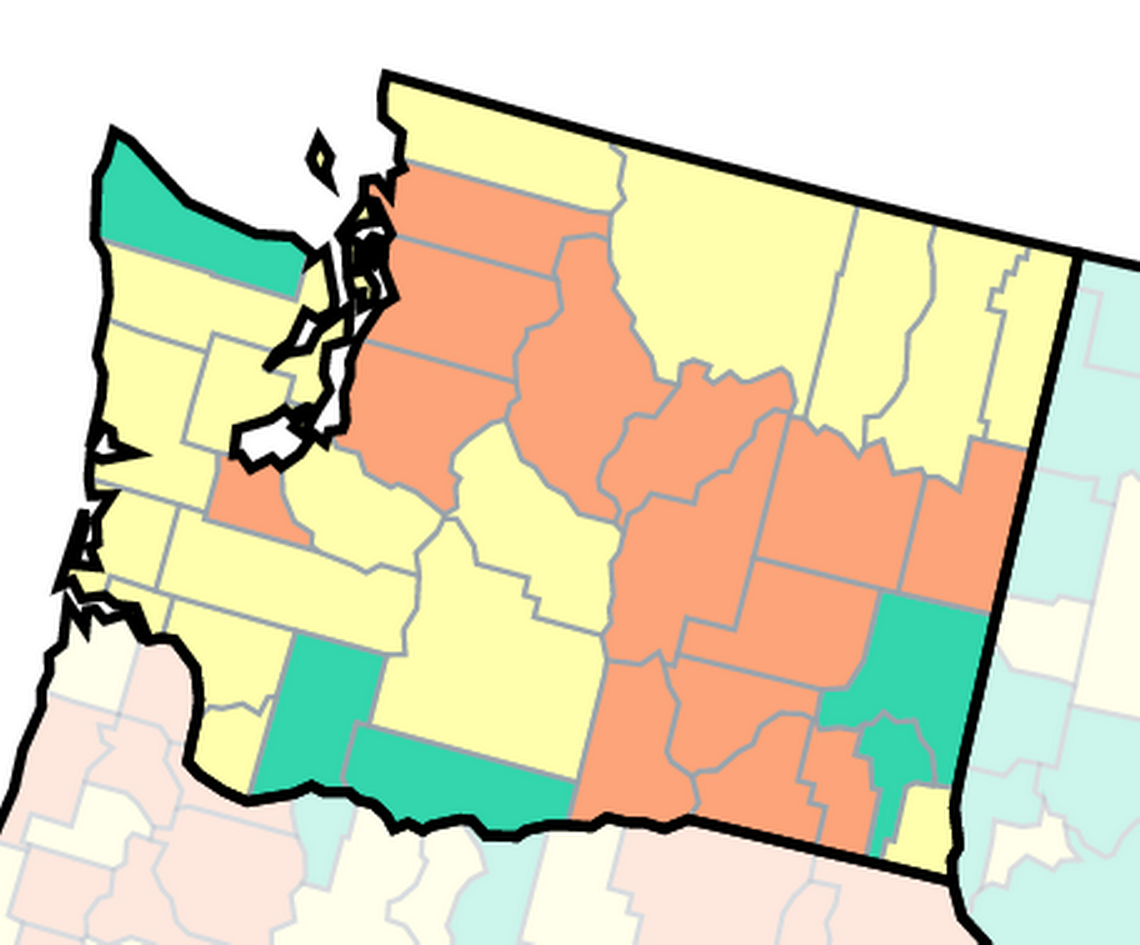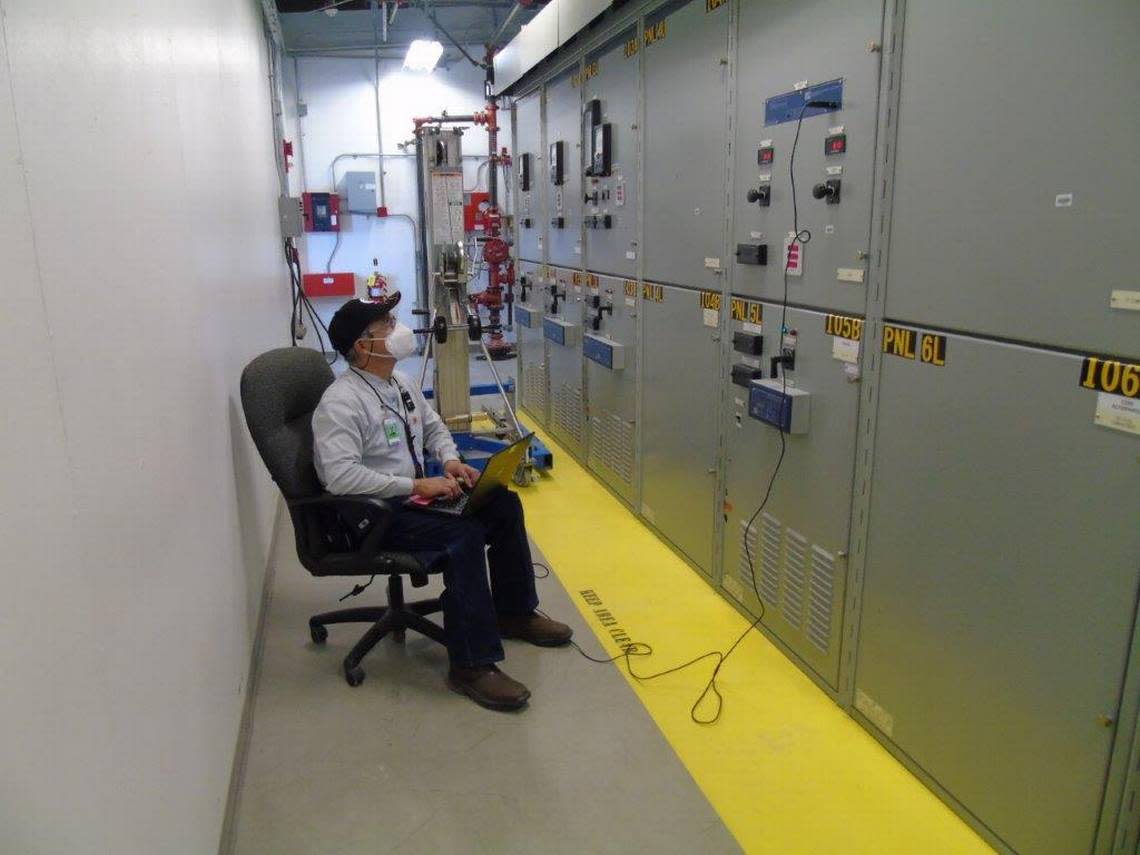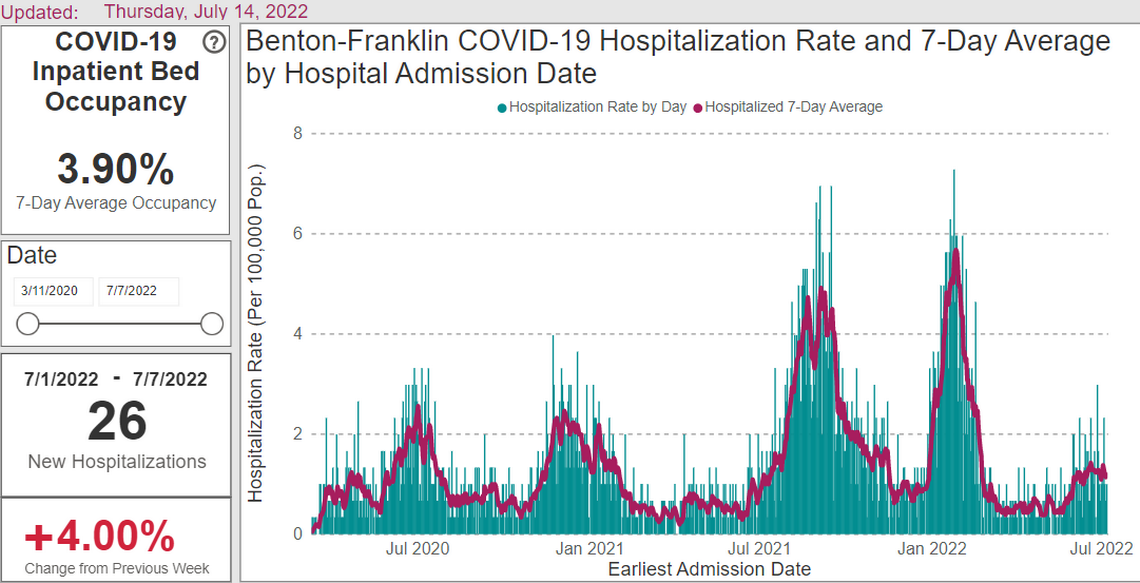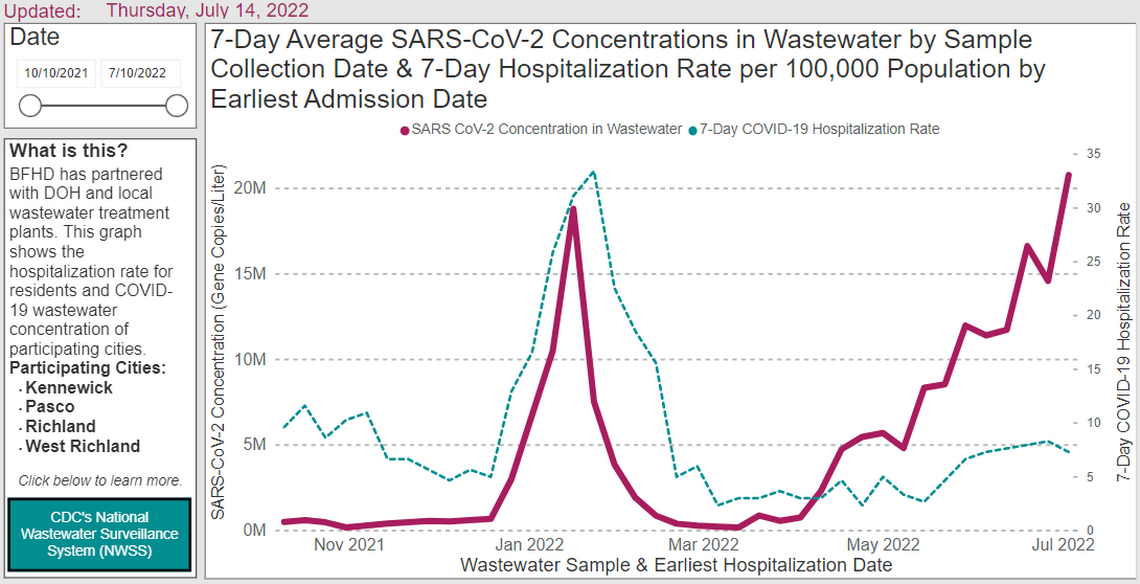CDC increases Tri-Cities COVID rating to ‘high.’ Thousands of workers must wear masks
Both Benton and Franklin counties have new ratings of “high” for COVID-19 community levels from the Centers for Disease Control and Prevention.
It’s the worst rating for the counties in recent months and up from ratings of “low” just a week ago.
The CDC recommends that people in the two counties wear masks indoors in public. The rating also triggers a requirement that workers at Pacific Northwest National Laboratory and the Hanford nuclear reservation wear face masks.
Tests of wastewater for genetic material of the coronavirus also show a high level of the virus in the Tri-Cities. The total level announced Thursday exceeds the peak in cases over the past winter that were fueled by the original omicron variant.
Now transmission in much of the nation is being driven by the spread of the BA-5 variant, in addition to the BA-4 variant, of omicron.
Fewer people are being hospitalized than with the original omicron variant, but deaths continue to be reported.

The Benton Franklin Health District reported three recent deaths due to complications of COVID-19 in its weekly report Thursday, bringing the total reported since the start of the pandemic to more than 700.
Doctors in Washington state also are warning of the risk of long COVID, with lingering symptoms, for those who are infected.
CDC COVID rating
In addition to recommending wearing masks indoors in public places for everyone in Benton and Franklin counties, the CDC says those at high risk of severe COVID-19 illness may need to take additional precautions.
They may want to avoid nonessential public indoor activities, have a plan for rapid testing and talk to their doctor about whether they are a candidate for treatments, including preventive treatments, according to the CDC.

In the coming week at the Hanford nuclear reservation, which employs about 11,000 people, masks are required indoors regardless of vaccination status, but with exceptions such as when an individual is alone in an office with the door shut.
Tours of the Hanford B Reactor, part of the Manhattan Project National Historical Park, have been canceled until the CDC rating drops.
At PNNL — which employs 5,350 people, the majority of them at its Richland campus — face coverings are required indoors, with some exceptions, for the coming week. Employees who have not been vaccinated must provide a negative test result and physically distance.
Benton and Franklin counties are among 14 in the state with a CDC rating of “high.” Twenty counties have ratings of “medium” and just five now have ratings of “low.”
Across the nation 25% of counties have “low” community levels of COVID-19, 40% have “medium” levels and 35% have “high” levels, according to the CDC.
The CDC rates counties based on the number of new COVID-19 cases, hospital beds used by patients with COVID and hospital admissions for people with the disease.
Tri-Cities COVID deaths
The three newly announced COVID-19 deaths were all residents of Benton County.
They included a woman in her 90s, and men in their 70s and 80s.
The Benton Franklin Health District reports recent deaths once a week, usually on a Thursday. Last Thursday five deaths were reported bringing the total for the month to date to eight.

July is on track to exceed the number of COVID-19 deaths reported in recent months. Seven to nine deaths were reported each of the past three months.
The deaths reported Thursday bring total COVID-19 deaths since the start of the pandemic to 701, including 485 residents of Benton County and 216 residents of Franklin County.
In the Tri-Cities, local public health officials verify that deaths are due to COVID complications by checking for a positive test result and that a coronavirus infection was named as a primary cause of death on the death certificate.
It can take several weeks for the district to receive and reconcile death information due to the reporting processes of medical facilities and coroner offices and the process of issuing and releasing death certificates.
Statewide, 13,434 residents have died of complications of COVID since the start of the pandemic, including 100 in the past week, according to data from the Washington state Department of Health.
Tri-Cities COVID cases
The new COVID case rate for the Tri-Cities was slightly down from earlier in the month, but higher than in June.
The Benton Franklin Health District on Thursday reported a new case rate for Benton and Franklin counties combined of 144 new cases per 100,000 people over a week. Case rates for the individual counties were about the same.
However, public health officials are looking to other metrics as home testing for COVID-19 increases in popularity and those test results usually are not reported for inclusion in new case rate data.
The concentration of genetic material from the coronavirus that causes COVID-19 in Tri-Cities wastewater was the highest this past week since testing began in late fall.

Concentrations surpassed the winter peak of COVID-19 caused by the original omicron variant of the coronavirus.
Untreated wastewater is collected from the municipal plants for Kennewick, Pasco, Richland and West Richland for testing.
Hospitals in Benton and Franklin counties are treating a total of about 26 patients for COVID-19 a week, which has held steady for July so far, but is above June levels.
Dr. Jeff Duchin, the health officer for Public Health — Seattle and King County, says the CDC has estimated that as of a couple weeks ago 65% to 95% of new COVID-19 cases in Washington, Oregon, Idaho and Alaska were caused by the new BA-5 subvariant of the omicron variant and to a lesser extent the new BA-4 subvariant.
Long COVID
The BA-5 subvariant is better at dodging people’s immunity both from previous COVID-19 infections and from vaccination.
“This means it is very easy for people who previously had COVID to get sick again,” he said at a news media briefing Thursday.
COVID-19 vaccination still provides protection against hospitalization and death, but boosters are important, especially for older people and those with underlying health conditions, he said.
“The most important piece of advice I can give you to keep you safer from COVID-19 is to be vaccinated and get your booster when eligible,” he said.

Even mild infections are worth preventing because each infection brings new risk for long COVID and other health problems, Duchin said.
Long COVID is defined as any new, returning or ongoing health problem four weeks or more after an initial COVID-19 infection.
Symptoms can last weeks, months, or in some cases years, he said.
Although long COVID is more likely in people who have severe initial cases, it also occurs in people who had mild or no symptoms.
Research suggests that being vaccinated lowers, but does not eliminate, the risk of long COVID, he said.
Some of the most common symptoms of long COVID are fatigue, brain fog, and blood pressure and heart rate issues that can leave people light headed or with a headache. Sleep problems also are common.
The UW Medicine clinic for post COVID-19 rehabilitation and recovery at Harborview Medical Center in Seattle sees long COVID patients of all walks of life and of all ages, including teens, said Dr. Janna Friedly, at the Thursday news briefing. They include people who were previously very healthy.
“COVID is like lighter fluid,” she said. “It just sets everything on fire.”
The General Accountability Office estimated in March that 7.7 million to 23 million people in the United States had developed long COVID.
